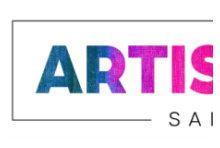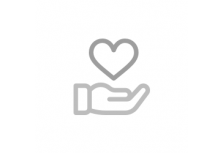Artists First incorporates a strength based and holistic philosophy recognizing and building on individual strengths. We are the only working open art studio, in which disenfranchised individuals are provided with the training and opportunity to make a financial income as a working artist. Through program activities, accessibility, full inclusion is increased. With each art exhibit, marketing of artwork and/or sale of artwork, stereotypes are dismantled and stigma associated with ... Czytaj dalej
Artists First incorporates a strength based and holistic philosophy recognizing and building on individual strengths. We are the only working open art studio, in which disenfranchised individuals are provided with the training and opportunity to make a financial income as a working artist. Through program activities, accessibility, full inclusion is increased. With each art exhibit, marketing of artwork and/or sale of artwork, stereotypes are dismantled and stigma associated with disenfranchised individuals are reduced. The organization has been successful in spearheading community initiatives such as interactive public art and community art exhibits that promote understanding and inclusion. Artists First’s history also includes diverse collaborations with other art organizations, educational institutions and social service agencies locally and nationally.
The Open Studio Program is an especially unique, multifaceted community resource with inclusive, strengths-based components. The Open Studio program is based on the social model. All activities are individualized and client directed. Each aspect is inclusive, strengths-based and utilizes social practice as an artistic discipline. The Open Studio challenges outdated program models and through its arts based program participants are connected to resources, have opportunities to build and maintain skills and to have a sense of purpose and meaningful experiences that promote continued learning and development of social networks. The Adult Open Studio connects adults with disabilities to professional supplies and technical facilitation by specialized staff. For many adults with disabilities there is a dearth of opportunity for genuine and respectful community involvement and continued growth and learning. When individuals with disabilities enter different stages in life, there is a drop in resources and opportunities for meaningful experiences and relationships. Isolation, stagnation and a decrease in overall wellbeing can be experienced. People with disabilities are often socially isolated and have limited contact with people other than paid caregivers. “Oftentimes activities or programs are segregated and structured in constricting ways that may not meet the needs or desires of participants. Negative factors for individuals with disabilities include outdated program models and a drop in services to develop soft and hard skills after exiting the school system” (Kraus, Lewis. 2016 Disability Statistics Annual Report.) Lifeworks directly benefits low income community members with developmental disabilities. Statistically (nearly 50%) of individuals with disabilities are underemployed or unemployed compared to individuals without disabilities. Missouri has one of the highest employment gaps (77.1 to 79.1%) in the country. There are many factors that contribute to the employment status of individuals with disabilities such as outdated program models. (Kraus, Lewis. (2017). 2016 Disability Statistics Annual Report. Durham, NH: University of New Hampshire). Lifeworks provides employment opportunities, aiding individuals to obtain their greatest potential and growth in employment, social, emotional and physical domains through creative self-expression thus promoting social equity. Artists First for Veterans addresses the reality that many veterans return to civilian life with challenges and needs. “According to the Department of Defense between 2010 and 2014 some 230,000 soldiers and veterans were identified as suffering from so called mild Traumatic Brain Injury (TBI)” (Alexander, C. (Feb. 2015) The Invisible War on the Brain National Geographic). In addition to physical injury, some veterans, as a result of their service, have endured psychological health needs such as Post Traumatic Stress Disorder (PTSD). Unmet mental health needs in veterans can lead to further physical and psychological problems, unemployment, substance abuse, incarceration and homelessness. The program allows veterans to share and process their experiences and thoughts while making art. The program specifically supports recovery and rehabilitation of veterans in transitional housing. Supplying current and former Armed Service members with creative and social resources needed to generate positive self-identity, reflection and community reintegration. The Youth Open Studio benefits all youth, but especially those who attend schools where art programs have been reduced or cut due to budget constraints. At-risk youth and those from less affluent school districts enjoy equitable art opportunities and education. Youth are provided a confidence-building, safe, social setting to learn about other cultures, ideologies and abilities, to work on conflict resolution skills, and to grow independently, socially and emotionally. The Youth Studio provides a respite from the toxic stress that affects area youth. An aim of the Youth Open Studio includes changing the current outcomes of transition aged youth who are disconnected. “1 in 9 youth 16-24 are neither working or attending school. According to a study that ranked the U.S. states by the number of at-risk youth, Missouri ranked 23” (J. Ryne Danielson, 2018). Opening Minds Through Art is an evidence-based art initiative developed by the Scripps Gerontology Center at Miami University serving elders experiencing memory loss due to dementia. OMA enables elders to assume new roles as artists and teachers while connecting with peer volunteers. Healing Trauma of Isms is a trauma and culturally informed, self-expression curriculum to aid individuals in healing from the negative effects of experiencing racism and other forms of oppression. The program is specifically designed to address the trauma and grief endured by those who have been discriminated against and who have been exposed to intersectional oppression. We start from the premise that systemic racism and intersectional oppression are real – no one has to prove it. The intent of the program is healing the negative effects oppression has on the mental and physical health of individuals from non-dominant groups. The program removes the barriers to empowerment by providing a safe and supportive space using specific creative activities to explore intersectionality based trauma and to address subsequent health inequities and to heal. In addition to the Open Studio program, Artists First brings art into the community and beyond as a means of integration, healing, support, working together, and finding common ground.
Ukryj cały tekst
